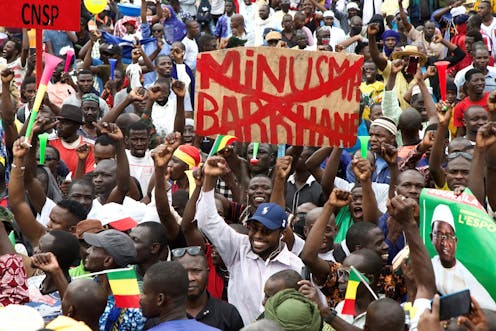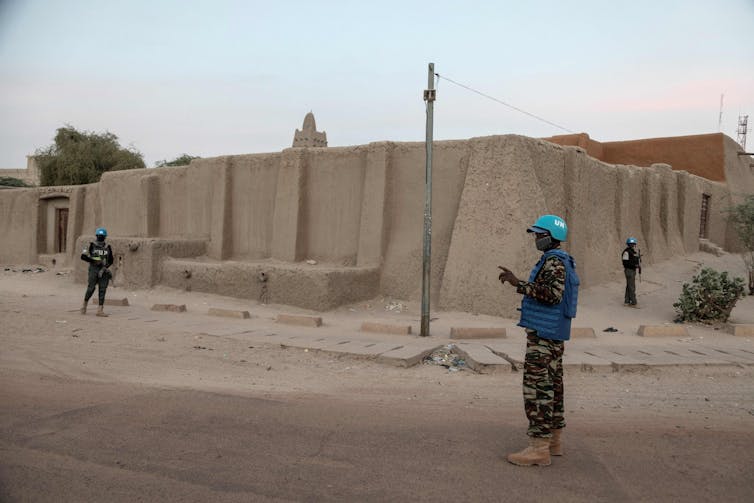
On 30 June 2023, the UN Security Council voted unanimously to end the mandate of the United Nations Multidimensional Integrated Stabilisation Mission in Mali (Minusma).
Two weeks earlier, Mali had called for the immediate withdrawal of the mission. Bamako and the UN have agreed on a six-month deadline between 1 July and 31 December for the complete withdrawal of troops. This political decision raises questions about the objectives being pursued by the Malian government.
Our research covers political, peace and security issues in Africa, and in our view, implementation of the UN resolution to exit Mali will have major security implications.
A costly and deadly mission
Minusma has an annual budget of US$1.2 billion and 15,000 personnel. It remains the world’s costliest and deadliest peacekeeping mission, with 174 deaths as a result of hostile acts.
The mission was set up in 2013 when the Malian state was on the verge of collapse after assaults by terrorist groups and Tuareg rebels. Minusma’s mandate was to support the political transition. It would also support the implementation of a peace agreement and protect civilians.
In 2017, the mission added logistical support for the G5 Sahel Sahel Joint Force (G5S-JF)to its mandate. The G5S-JF is a military force launched in 2017 by Mali, Burkina Faso, Mauritania, Niger and Chad to combat terrorism and organised crime in the region.
After Mali withdrew from this force in 2022, Minusma sub-contracted private companies to deliver survival consumables to the troops operating in the other G5 Sahel countries. This will no longer be possible with the end of the UN mission in Mali.
Disagreement over security policy
Before the military coups in Mali in 2020 and 2021, security cooperation between the Malian army and international forces was overseen by the French operation Barkhane and Minusma. Relations between Bamako and Minusma began to deteriorate after the military came to power.
Bamako’s request to end the mission came as no surprise. It was the culmination of dissension between the transitional government and the UN mission. This crisis of confidence is part of a broader disagreement between Mali and its regional and international partners over how to secure the country and resolve the politico-military conflicts in the north.
The lack of tangible security results after several years of military presence in Mali – Barkhane, Europe’s joint task force Takuba, the G5 Sahel and a European mission to advise and train the Malian army – has led to strong criticisms at the national level.
Transitional authorities said this ineffectiveness was the main reason for their change of strategy. Bamako has accused the UN mission of becoming part of the problem in Mali.

Mali has chosen to turn to Russia to combat insecurity. This option seems to be taking place at the expense of relations between Bamako and the West against the backdrop of the war in Ukraine.
Admittedly, the UN mission has many shortcomings. Its mandate and strategy need to be better-suited to the Malian situation.
Mali’s security challenges are not limited to implementing its peace and reconciliation agreement. The challenges include armed terrorist groups, intercommunity conflicts and organised crime, which cause many deaths. Nevertheless, the fight against terrorism has not been part of Minusma’s mandate.
The withdrawal of international actors from Mali, which began in 2022, was a major turning point in the stabilisation of the country. Security conditions continue to deteriorate. In the Liptako-Gourma border area between Burkina Faso, Mali and Niger, for instance, violent extremist groups continue to exploit the security vacuum linked to Barkhane’s departure.
Human rights at stake
Minusma has not been very effective in protecting civilians – 2020 was the bloodiest year for civilians in Mali. However, the UN mission has a human rights division that played an important role in supervising and investigating violations of human rights and international humanitarian law.
The investigations and publications on this subject have been one of the main points of contention with the transitional government.
The state of human rights and international humanitarian law will likely deteriorate further with the end of the UN mission.
The challenges
Mali is heading toward a decisive presidential election in February 2024, which should lead to a return to constitutional order. Given the country’s instability, however, it will be a real challenge to organise an election.
Mali is home to the largest number of armed groups in the Sahel region – no fewer than 60. Its stability is essential for the people of Mali, and for international peace and security.
The transitional government may be determined to change its partners to combat terrorist and criminal groups more effectively, but results are unlikely to follow.
Mali’s security challenges are complex. There is no significant improvement in the resources, or the strategies and governance mechanisms mobilised.
With the end of the UN mission and the logistical support provided to the G5 Sahel Joint Force, the other countries in the region will become more vulnerable to terrorist groups. Given its central position in the Sahel and the transnational nature of security challenges, it will be difficult to combat insecurity without Mali.
It will be also challenging for Mali to ensure its stability without robust international assistance and cooperation with neighbouring countries like Burkina Faso and Niger.
The rapprochement with Moscow, however, has enabled the Malian army to acquire new equipment. This includes surveillance aircraft, fighter jets and attack helicopters.
Intercommunity tensions
The persistence of the war in Ukraine and the recent conflict between Moscow and Yevgeny Prigozhin, the leader of the paramilitary group Wagner, are likely to compromise the continuity of Russian support in terms of military resources. It may also impact the availability of Russian fighters and instructors that the Malian army needs to combat insecurity and restore state authority nationwide.
Another major challenge facing Mali after the withdrawal of Minusma is national reconciliation. The chaos created by intercommunity tensions in the north and centre of the country has weakened the state over the past decade. The presence of international troops reduced the risk of clashes between the Malian army and the armed groups of the north united under the Coordination des Mouvements de l'Azawad.
The vacuum left by these international forces may relaunch hostilities as the implementation of the peace and reconciliation agreement stalls.
To prove themselves worthy of the ambitions for sovereignty displayed since coming to power, the transitional authorities should relaunch the inter-Malian peace process. They should resolve the Tuareg problem while fighting terrorist organisations.
The military’s determination to succeed where international forces have failed is a source of hope and a challenge.
The authors do not work for, consult, own shares in or receive funding from any company or organisation that would benefit from this article, and have disclosed no relevant affiliations beyond their academic appointment.
This article was originally published on The Conversation. Read the original article.







